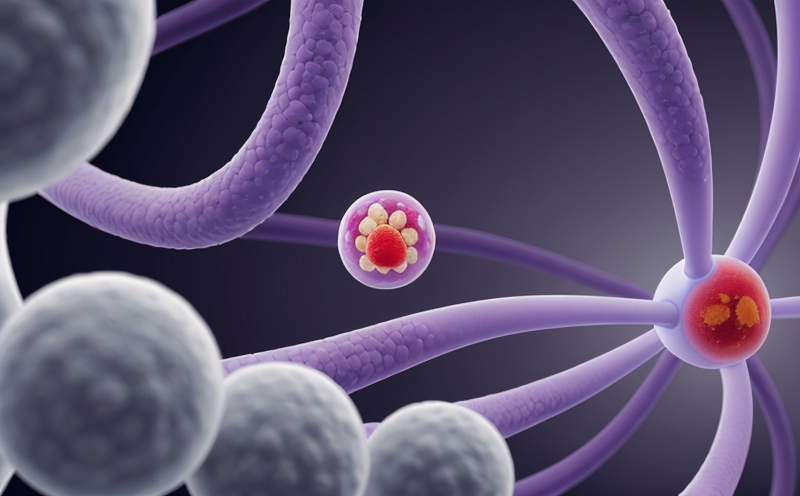HER2 IHC Testing in Veterinary Mammary Tumors
The assessment of HER2 (human epidermal growth factor receptor 2) status has become increasingly important in the diagnosis and treatment planning for human breast cancer. However, its significance extends beyond the medical field into veterinary oncology, where the same biomarker plays a crucial role in predicting therapeutic responses to trastuzumab (Herceptin). This service page focuses on HER2 immunohistochemistry (IHC) testing specifically applied to mammary tumors in dogs and cats.
In veterinary medicine, mammary cancer is one of the most common malignancies observed in female dogs and cats. Understanding the molecular characteristics of these tumors can help predict their behavior and response to therapy. The HER2 protein is a cell surface receptor that promotes tumor growth when overexpressed. Detecting this marker through IHC testing allows for more personalized treatment approaches, reducing unnecessary treatments for those whose tumors do not require them.
HER2 IHC testing in veterinary mammary tumors typically follows standard protocols adapted from human medical practices but tailored to the unique anatomical and physiological differences between species. Specimens are usually collected via fine needle aspiration or excisional biopsy and processed according to established guidelines for immunostaining. The antibodies used target specific regions of the HER2 protein, allowing visualization under a microscope.
The interpretation of results involves examining the intensity and distribution pattern of staining within tumor cells. A score system ranging from 0 (no staining) to 3+ (strongest possible staining) is commonly employed. Scores of 1+ or higher indicate positive expression levels of HER2, suggesting eligibility for targeted therapies like trastuzumab.
Accurate and reliable HER2 IHC testing in veterinary settings requires stringent quality control measures and adherence to international standards such as those outlined by the International Society for Veterinary Pathology (ISVP) and the College of American Pathologists (CAP). These organizations provide guidelines that ensure consistency across laboratories performing these tests.
Standardization is critical given the differences between human and veterinary healthcare systems. While humans may undergo regular screenings, pets rarely receive routine mammograms or other preventative measures against breast cancer. Therefore, accurate diagnosis based on available clinical signs often leads to incidental discovery of disease during routine examinations or when investigating other health issues.
For research purposes, HER2 IHC testing also plays a vital role in understanding the molecular mechanisms underlying mammary carcinogenesis and progression in companion animals. By comparing expression patterns across various breeds and populations, scientists can identify potential risk factors and develop targeted interventions tailored to specific subgroups within canine or feline populations.
In conclusion, HER2 IHC testing offers valuable insights into the biology of mammary tumors in dogs and cats, enabling more precise diagnosis and treatment strategies. It represents a significant advancement in veterinary oncology, contributing to improved patient outcomes through personalized medicine approaches.
Benefits
The implementation of HER2 IHC testing brings numerous advantages to both veterinarians and pet owners:
- Precision Diagnosis: By identifying HER2-positive tumors, this test helps determine which pets are most likely to benefit from targeted therapies.
- Better Treatment Decisions: Understanding the molecular profile of a tumor allows for more tailored treatment plans, potentially improving response rates and overall survival.
- Cost Efficiency: Avoiding unnecessary treatments for HER2-negative tumors saves time and resources while ensuring appropriate care for those who truly need it.
- Promotes Research: Collecting data on HER2 expression patterns can contribute to scientific knowledge about mammary carcinogenesis in pets, leading to better prevention strategies.
- Better Quality of Life: Effective treatment options based on HER2 status can lead to prolonged remission periods and enhanced well-being for affected animals.
In summary, incorporating HER2 IHC testing into routine diagnostics enhances the accuracy of cancer diagnoses and supports informed decision-making processes in veterinary oncology.
International Acceptance and Recognition
The use of HER2 IHC testing for mammary tumors in animals has gained acceptance worldwide, with several international bodies endorsing its application:
- American College of Veterinary Pathologists (ACVP): ACVP recognizes the importance of HER2 IHC testing and includes it as part of their curriculum.
- European Society for Veterinary Pathology (ESVP): ESVP recommends incorporating this test into clinical practice to improve patient outcomes.
- International Society for Veterinary Hematology and Oncology (ISVHO): ISVHO supports the use of HER2 IHC testing as a standard procedure in veterinary oncology.
- World Small Animal Veterinary Association (WSAVA): WSAVA acknowledges the role of this test in advancing diagnostic capabilities within small animal medicine.
These organizations highlight the value of integrating HER2 IHC into routine practices, emphasizing its contribution to improved accuracy and better patient care. Compliance with these standards ensures consistency across different institutions and enhances trust among stakeholders involved in veterinary oncology.
Competitive Advantage and Market Impact
Incorporating HER2 IHC testing into a laboratory’s service portfolio offers several competitive advantages:
- Differentiation: Offering this specialized test distinguishes your lab from competitors by providing high-quality, cutting-edge diagnostics.
- Patient Trust: Providing state-of-the-art services builds confidence among veterinarians and pet owners about the quality of care their animals receive.
- Research Collaboration: Your laboratory can establish collaborative relationships with academic institutions and pharmaceutical companies seeking to advance knowledge in veterinary oncology.
- Patient Retention: By offering comprehensive services, you encourage clients to return for further testing needs, fostering long-term partnerships.
- Market Expansion: Expanding your service offerings into specialized areas like HER2 IHC testing can attract new clientele interested in advanced diagnostics.
The increasing demand for personalized medicine across various sectors, including veterinary oncology, presents a growing market opportunity. By staying ahead of trends and providing innovative solutions, you position yourself as a leader in the field, contributing significantly to both professional recognition and financial success.





